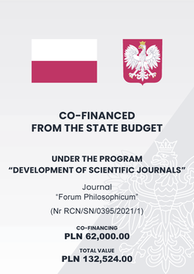- Home »
- Issues »
- 26/1 – Spring 2021 »
- Articles »
Distributed Cognition, Neuroprostheses and their Implications to Non-Physicalist Theories of Mind
Abstract
This paper investigates the notion of ‘distributed cognition’ – the idea that entities external to one’s organic brain participate in one’s overall cognitive functioning – and the challenges it poses. Related to this is also a consideration of the ever-increasing ways in which neuroprostheses replace and functionally replicate organic parts of the brain. However, the literature surrounding such issues has tended to take an almost exclusively physicalist approach. The common assumption is that, given that non- physicalist theories (dualism, hylomorphism) postulate some form of immaterial ‘soul’, then they are immune from the challenges that these advances in cognitive science pose. The first aim of this paper, therefore, is to argue that this is not the case.
The second aim of this paper is to attempt to elucidate a route available for the non- physicalist that will allow them to accept the notion of distributed cognition. By appealing to an Aristotelian framework, I propose that the non-physicalist can accept the notion of distributed cognition by appeal to the notion of ‘unitary life’ which I introduce as well as Aristotle’s dichotomy between active and passive mind.
Keywords
Cite this article
Gové, Jean. “Distributed Cognition, Neuroprostheses and their Implications to Non- Physicalist Theories of Mind.” Forum Philosophicum 26, no. 1 (2021): 123–42. doi:10.35765/forphil.2021.2601.08.
Bibliography
Adams, Frederick, and Kenneth Aizawa. 2008. The Bounds of Cognition. Malden, MA: Wiley-Blackwell.
Aristotle. 1984. The Complete Works of Aristotle: The Revised Oxford Translation. edited by Jonathan Barnes. Princeton: Princeton University Press.
Baker, Lynne Rudder. 2000. Persons and Bodies: A Constitution View. Cambridge: Cambridge University Press.
———. 2009. “Persons and the Extended-Mind Thesis.” Zygon 44 (3): 642–58.
———. 2011. “Christian Materialism in a Scientific Age.” International Journal for Philosophy of Religion 70 (1): 47–59. https://doi.org/10.1007/s11153-010-9283-0.
Bremer, Józef. 2017. “Soul or Mind? Some Remarks on Explanation in Cognitive Science.” Scientia et Fides 5 (2): 39–70. https://doi.org/10.12775/SetF.2017.023.
Buller, Tom. 2013. “Neurotechnology, Invasiveness and the Extended Mind.” Neuroethics 6 (3): 593–605. https://doi.org/10.1007/s12152-011-9133-5.
Carter, J. Adam, and S. Orestis Palermos. 2016. “Is Having Your Computer Compromised a Personal Assault? The Ethics of Extended Cognition.” Journal of the American Philosophical Association 2 (4): 542–60. https://doi.org/10.1017/apa.2016.28.
Clark, Andy. 2008. Supersizing the Mind. Oxford: Oxford University Press.
Clark, Andy, and David Chalmers. 1998. “The Extended Mind.” Analysis 58 (1): 7–19. https://doi.org/10.1093/analys/58.1.7.
Cohen, S. Marc. 1995. “Hylomorphism and Functionalism.” In Essays on Aristotle’s De Anima, edited by Martha Nussbaum and Amélie Oksenberg Rorty, 61–76. Oxford: Oxford University Press.
Hershenov, David B. 2008. “A Hylomorphic Account of Thought Experiments Concerning Personal Identity.” American Catholic Philosophical Quarterly 82 (3): 481–502. https://doi.org/10.5840/acpq200882332.
Olson, Eric T. 1997. The Human Animal: Personal Identity Without Psychology. Oxford: Oxford University Press.
———. 2003. “Personal Identity.” In The Blackwell Guide to Philosophy of Mind, edited by Stephen P. Stich and Ted A. Warfield, 352–68. Oxford: Blackwell Publishing.
———. 2007. What Are We? A Study in Personal Ontology. Oxford: Oxford University Press.
———. 2011. “The Extended Self.” Minds and Machines 21: 481–95. https://doi.org/10.1007/s11023-011-9258-7.
Rupert, Robert D. 2018. “The Self in the Age of Cognitive Science: Decoupling the Self from the Personal Level.” Philosophic Exchange 47 (1): 1–36.
Shields, Christopher. 2016. “Aristotle’s Psychology.” The Stanford Encyclopedia of Philosophy. https://plato.stanford.edu/archives/win2016/entries/aristotle-psychology/.
Swinburne, Richard. 2019. Are We Bodies or Souls? Oxford: Oxford University Press.
Wilkes, K. V. 1995. “Psuchē versus the Mind.” In Essays on Aristotle’s De Anima, edited by Martha Nussbaum and Amélie Oksenberg Rorty, 110–28. Oxford: Oxford University Press.
Wilson, Robert A., and Andy Clark. 2009. “How to Situate Cognition: Letting Nature Take Its Course.” In The Cambridge Handbook of Situated Cognition, edited by Murat Aydede and P. Robbins, 55–77. Cambridge: Cambridge University Press.
Wilson, Robert A., and Bartłomiej A. Lenart. 2015. “Extended Mind and Identity.” In Handbook of Neuroethics, edited by Jens Clausen and Neil Levy, 423–39. Dordrecht: Springer.





